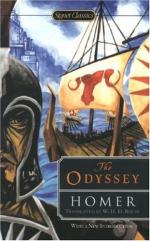And Ulysses said, “Nausicaa, daughter of great Alcinous, may Jove the mighty husband of Juno, grant that I may reach my home; so shall I bless you as my guardian angel all my days, for it was you who saved me.”
When he had said this, he seated himself beside Alcinous. Supper was then served, and the wine was mixed for drinking. A servant led in the favourite bard Demodocus, and set him in the midst of the company, near one of the bearing-posts supporting the cloister, that he might lean against it. Then Ulysses cut off a piece of roast pork with plenty of fat (for there was abundance left on the joint) and said to a servant, “Take this piece of pork over to Demodocus and tell him to eat it; for all the pain his lays may cause me I will salute him none the less; bards are honoured and respected throughout the world, for the muse teaches them their songs and loves them.”
The servant carried the pork in his fingers over to Demodocus, who took it and was very much pleased. They then laid their hands on the good things that were before them, and as soon as they had had to eat and drink, Ulysses said to Demodocus, “Demodocus, there is no one in the world whom I admire more than I do you. You must have studied under the Muse, Jove’s daughter, and under Apollo, so accurately do you sing the return of the Achaeans with all their sufferings and adventures. If you were not there yourself, you must have heard it all from some one who was. Now, however, change your song and tell us of the wooden horse which Epeus made with the assistance of Minerva, and which Ulysses got by stratagem into the fort of Troy after freighting it with the men who afterwards sacked the city. If you will sing this tale aright I will tell all the world how magnificently heaven has endowed you.”
The bard inspired of heaven took up the story at the point where some of the Argives set fire to their tents and sailed away while others, hidden within the horse, {73} were waiting with Ulysses in the Trojan place of assembly. For the Trojans themselves had drawn the horse into their fortress, and it stood there while they sat in council round it, and were in three minds as to what they should do. Some were for breaking it up then and there; others would have it dragged to the top of the rock on which the fortress stood, and then thrown down the precipice; while yet others were for letting it remain as an offering and propitiation for the gods. And this was how they settled it in the end, for the city was doomed when it took in that horse, within which were




